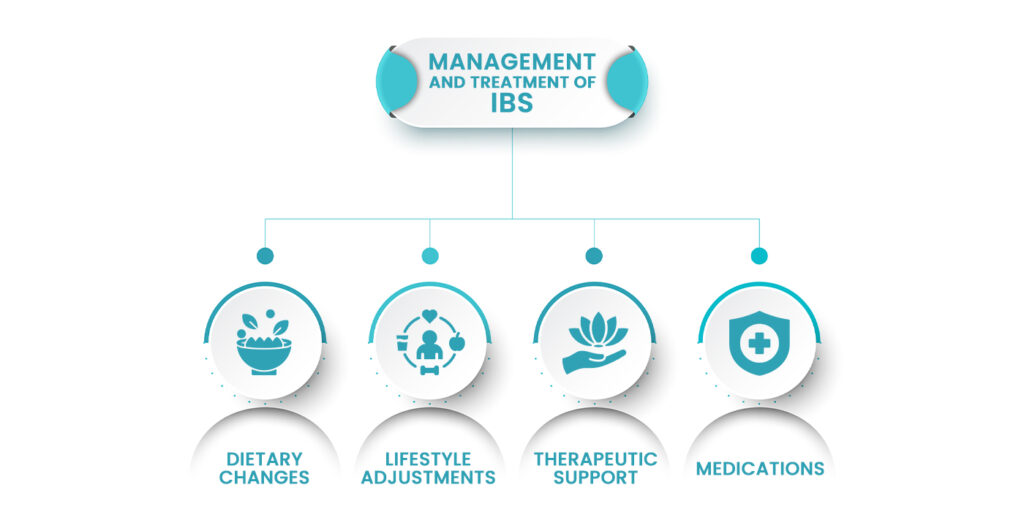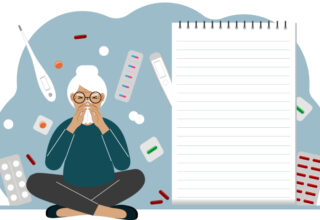Digestive health plays an important role in our overall well-being, yet it is often overlooked until something goes wrong. One common yet frequently misunderstood digestive condition is Irritable Bowel Syndrome (IBS).
In this blog we are going to learn about irritable bowel syndrome (IBS), what it is, its types, causes, symptoms, triggers, risk factors, and how it can be effectively managed.
What is IBS?
Irritable bowel syndrome (IBS) is a common and chronic (long term) condition that affects the digestive system. It causes symptoms like stomach cramps, bloating, diarrhea or constipation, or both. These symptoms often come and go, sometimes lasting for days or even months.
IBS is not a life threatening condition and doesn’t damage your gastrointestinal (GI) tract or increase the risk of more serious diseases like colon cancer. However, it can be challenging to manage and may significantly affect your daily life.
Types of IBS:
IBS is generally classified based on the appearance of your stool during symptom flare-ups. Many people with IBS experience normal bowel movements on some days and abnormal bowel movements on others. It is the abnormal bowel patterns that determine the specific type of IBS.
- IBS with constipation (IBS-C)— most stools are hard and lumpy
- IBS with diarrhea (IBS-D)— most stools are loose and watery
- IBS with mixed bowel habits (IBS-M)— a combination of both hard and loose stools
These differences matter, because the treatment options often vary depending upon the type of IBS you have.
Symptoms of IBS:
Symptoms of IBS can vary in frequency— they might occur regularly or show up only during flare-ups. This means you may go through periods without any discomfort, having normal bowel movements, followed by times when symptoms resurface.
Common symptoms of IBS include:
- Abdominal pain or cramping, often linked to the urge to poop
- Excessive gas or bloating
- Diarrhoea, constipation, or a mix of both
- Presence of mucus in the stool, often appearing whitish
- A feeling that you are unable to empty your bowels after pooping
Causes of IBS:
The exact cause of IBS is not fully understood, but researchers classify it as a neurogastrointestinal disorder— a condition involving disruption in how the brain and gut work together. These are also called disorders of gut-brain interaction, where miscommunication between the two can affect the normal digestion.
This miscommunication can lead to:
- Dysmotility— the muscles in the GI tract may not contract properly to move food through the digestive system. The colon (large intestine) often contracts more, leading to abdominal cramps and pain.
- Visceral hypersensitivity— the nerves in the GI tract may become overly sensitive. People with IBS often feel pain or discomfort more intensely than those without this condition.
Other causes of IBS may include:
-
- Gut microbiome imbalance— research shows that people with IBS often have different types and levels of bacteria in their gut compared to those without the condition.
- Post gastrointestinal infections— some people develop IBS after severe gastrointestinal infections, suggesting germs may also play a role.
- Food Sensitivities— sensitivities to certain foods may also contribute.
- Childhood stress or trauma— those who have experienced severe stress in childhood such as emotional, physical, or sexual abuse are at a higher risk of developing IBS later in life.
Common Triggers for IBS:
While triggers don’t cause IBS directly, they can provoke or worsen symptom flare-ups. Common IBS triggers include:
- Diet— high fat diet, processed foods, dairy, gluten, artificial sweeteners, and caffeine are known to trigger symptoms in many people.
- Stress— emotional stress and anxiety can also intensify IBS.
- Hormonal changes— women often notice symptom flare-ups around their menstrual cycle, likely due to changing hormone levels.
- Medications— some drugs, especially antibiotics, may disrupt gut bacteria and may contribute to digestive issues in people with IBS.
Risk Factors for IBS:
While anyone can have IBS, certain factors increase the likelihood:
- Gender— women are more likely to experience IBS.
- Age— though it can develop at any age, it often starts in the teens or early adulthood.
- Family history—genetics may play a role.
- Mental health issues— anxiety, depression, and other mental health problems can increase the risk.
- History of sexual, physical, or emotional abuse.
- History of gastrointestinal infections or food intolerance.
- Certain chronic pain conditions like fibromyalgia and chronic fatigue syndrome are also associated with increased risk of IBS.
Management and Treatment of IBS:

There is no one-size-fits-all treatment for IBS, but many people are able to manage their symptoms with a combination of dietary changes, lifestyle adjustments, medications, and therapy. While these treatments may not completely eliminate the symptoms, they can significantly reduce flare-ups and improve the overall quality of your life.
1. Dietary Changes:
Working with a dietician may help you identify and avoid food triggers. Common dietary strategies include:
- Increasing fiber intake with fruits, vegetables, whole grains, and nuts.
- Using fiber supplements if dietary fiber is not enough.
- Limiting dairy due to lactose sensitivity and replacing it with calcium rich non-dairy foods like spinach, broccoli, or salmon.
- Avoiding gluten, which can trigger the symptoms even in those without celiac disease.
- Reducing intake of gas-producing foods such as beans, brussels, cabbage, and carbonated drinks.
- Drinking plenty of water, at least 2 liters (about 8 glasses) daily, to support digestion.
- Keeping a food diary to track what you eat and identify patterns linked to symptom flare-ups.
2. Lifestyle Adjustments:
Adapting these lifestyle changes may also help:
- Exercising regularly—aim for 30 minutes of moderate activity like walking or cycling, most days of the week.
- Practicing relaxation techniques like deep breathing, yoga, and meditation.
- Getting enough quality sleep—aim to get 7 to 8 hours of sleep everyday.
3. Therapeutic Support:
Mental health plays a big role in IBS. Therapy can help manage stress, anxiety, and depression, which are often linked to symptom flare-ups. Common therapeutic approaches include:
- Cognitive Behavioral Therapy (CBT)
- Hypnotherapy
- Biofeedback
4. Medications:
Depending on your symptoms, your healthcare provider may recommend:
- Antidepressants such as TCAs or SSRIs, if you suffer from anxiety, depression, or significant abdominal pain.
- Laxatives or fiber supplements for constipation.
- Anti-diarrheal medications to help firm up stools.
- Antispasmodic drugs to reduce cramping.
- Some healthcare providers may also suggest probiotics, which are beneficial bacteria that support gut health, although research on their effectiveness is ongoing.
- Your doctor may also give you medicines specifically used to treat IBS, such as Hyoscyamine.
When to See a Doctor:
It is important to consult a healthcare provider if you notice changes in your bowel habits or other symptoms linked to IBS. While these issues may be due to IBS, they can also point towards a more serious condition. Be alert to more concerning symptoms like:
- Unintentional weight loss
- Diarrhea that occurs during the night
- Blood in your stool or rectal bleeding
- Iron deficiency anemia
- Unexplained vomiting
- Persistent abdominal pain that doesn’t improve after passing gas or having a bowel movement
Final Thoughts:
Living with IBS can be frustrating and unpredictable, but it’s not unmanageable. Understanding your triggers, making thoughtful life choices, seeking support— both medical and emotional— can make a world of difference. All cases of IBS are not the same, so finding what works for you may take some time and patience.
If you are struggling with ongoing digestive symptoms, don’t ignore them. Talk to your doctor, rule out other conditions, and work toward a plan that helps you feel better and more in charge of your digestive health. (Learn more about how to support your digestive health)








